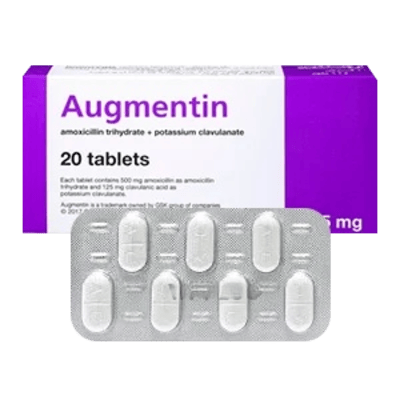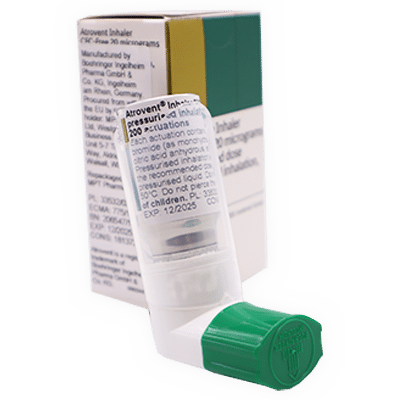I took Augmentin on the recommendation of a doctor when I had a severe respiratory infection. The medicine really helped me get over the illness quickly, but I had some mild digestive problems. Although there were some minor inconveniences, the results were worth it.

Augmentin
- Quality products
- Support 24/7
- Fast delivery
What is it?
Augmentin is a broad-spectrum antibiotic that fights bacteria. This medicine is effective against various aerobic (developing in an oxygen environment) and anaerobic (developing in an oxygen-free environment) gram-positive and aerobic gram-negative microorganisms, including strains that produce beta-lactamase, an enzyme that destroys penicillin. Potassium clavulanate, which is part of the drug, provides resistance of Augmentin to the activity of bacterial beta-lactamases. This drug is used to treat pneumonia and other infectious diseases of the respiratory tract, gastrointestinal tract, genitourinary system, postoperative infections and many other problems.
Composition
Augmentin contains several active and auxiliary components that ensure its effectiveness. The main active ingredient is amoxicillin, which makes it a strong antibiotic for fighting bacteria. In addition to amoxicillin, the composition includes potassium clavulanate, which protects the antibiotic from the destructive action of bacterial beta-lactamases.
- Amoxicillin
- Potassium clavulanate
- Excipients
Each component performs its unique role in ensuring maximum effectiveness of the drug, allowing Augmentin to work effectively against a wide range of bacteria resistant to traditional penicillins.
How to use?
How to use Augmentin is important for every patient to know to achieve the best results. The medicine should be taken as recommended by the doctor, as the dosage may vary depending on the severity of the disease, the location of the infection and the sensitivity of the pathogens.
- The drug should be taken at regular intervals.
- The tablet can be washed down with water, and in the form of a chewable tablet - chewed before swallowing.
- Do not increase the dose without consulting a doctor, as this may lead to undesirable consequences.
It is important to adhere to a regular schedule of administration and not to exceed the prescribed dosage in order to minimize the risk of side effects and increase the effectiveness of treatment.
How does it work?
Augmentin works by inhibiting bacterial cell wall synthesis, which kills bacteria. Amoxicillin, the main component of the drug, actively fights bacteria by destroying their structure and preventing reproduction. Potassium clavulanate protects amoxicillin from the effects of enzymes that can destroy it, thereby enhancing its effect.
This combination of components allows Augmentin to be effective in combating bacteria that have developed resistance to other penicillin antibiotics. Due to this, the drug is widely used to treat infections caused by various strains of bacteria. Maintaining high efficiency requires strict adherence to the dosage regimen, which allows Augmentin to effectively cope with infections.
Indications
Augmentin is indicated for the treatment of a number of infectious diseases, which it successfully copes with due to its composition and properties.
- Pneumonia and other respiratory infections
- Gastrointestinal tract infections
- Urinary tract infections
- Postoperative infections
- Skin infections
Thanks to its wide spectrum of action, Augmentin is effectively used in medical practice to combat infections of various origins and localizations, due to which it has received wide recognition among doctors and patients.
Contraindications
Like any medicine, Augmentin has its contraindications, which are important to consider before starting to take it. Some patients need to look for alternative treatments for safety reasons.
- Allergy to penicillin antibiotics
- Liver dysfunction
- Kidney problems
- Mononucleosis
Neglecting these contraindications can lead to adverse reactions and complications, so it is important to follow the instructions and recommendations of the attending physician.
Side effects
Like any medication, Augmentin has side effects that may occur during the course of treatment.
- Dyspepsia and abdominal discomfort
- Nausea and vomiting
- Liver problems
- Jaundice
- Skin rash and itching
- Allergic reactions, including hives
Knowledge of possible side effects helps the patient to be more aware and prepared to quickly respond to any changes in health. However, most symptoms usually disappear after the end of the course of treatment.
Frequently asked questions
Augmentin Reviews and Experiences
At first I was afraid to take antibiotics, but after talking to my doctor I decided to try Augmentin. The infection went away pretty quickly and I didnt notice any side effects, which was a big plus for me. I hope there wont be a need for antibiotics in the future, but if anything happens, I know I can trust this product.
I have to resort to antibiotics from time to time, and Augmentin turned out to be a great choice for me. The main thing is that I felt relief after a couple of days of taking it. True, there was some skin irritation, but it quickly passed. I think this is a small minus compared to how quickly the antibiotic copes with the infection.









